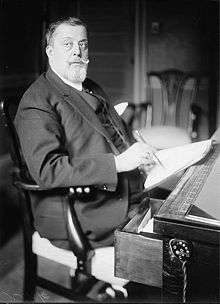Giulio Gatti-Casazza
| Giulio Gatti-Casazza | |
|---|---|
 | |
| General Manager of the Metropolitan Opera | |
|
In office 1908–1935 | |
| Preceded by | Heinrich Conried |
| Succeeded by | Herbert Witherspoon |
| General Manager of La Scala | |
|
In office 1898–1908 | |
| Personal details | |
| Born |
February 3, 1869 Udine, Italy |
| Died | September 2, 1940 (aged 71) |
| Spouse(s) |
Frances Alda (m. 1910–28) Rosina Galli |
Giulio Gatti-Casazza (3 February 1869 – 2 September 1940) was an Italian opera manager. He was general manager of La Scala in Milan, Italy from 1898 to 1908 and later the Metropolitan Opera in New York City from 1908 to 1935.[1]
Biography
Gatti-Casazza was born on 3 February 1869 in Udine, in northeastern Italy. In 1893 he succeeded his father as manager of the municipal theatre in Ferrara. He was manager of La Scala from 1898 to 1908, before his move to New York City. He was head of the Metropolitan Opera from 1908 to 1935. Under his leadership the Metropolitan enjoyed a prolonged era of artistic innovation and musical excellence. He brought with him conductor Arturo Toscanini, who led the company in performances of Verdi, Wagner and others that set standards for the company which have endured to the present day. The Viennese composer Gustav Mahler also was a Met conductor during Gatti-Casazza's first two seasons and in later years conductors Tullio Serafin and Artur Bodanzky led the company in the Italian and German repertories respectively.[1]
Thanks to Gatti-Casazza's artistic and organizational skill the Metropolitan attracted the best singers and conductors, and, on 10 December 1910, hosted its first World premiere, La Fanciulla del West by Giacomo Puccini. Many noted singers of the era appeared at the Met under Gatti-Casazza's leadership, including Rosa Ponselle, Emmy Destinn, Frances Alda, Amelita Galli-Curci, Maria Jeritza, Lily Pons; Enrico Caruso, Jacques Urlus, Giovanni Martinelli, Beniamino Gigli, Feodor Chaliapin, Titta Ruffo, Giacomo Lauri-Volpi, and Lauritz Melchior.
For his accomplishments Gatti-Casazza was one of the first Italians (and the first Italian living in the United States) to be featured on the cover of Time Magazine. He was on the weekly's cover twice; on 5 November 1923, and again on 1 November 1926.[2]
In 1910, he married the soprano Frances Alda.[3] They divorced in 1928 and he married the dancer Rosina Galli. He retired in 1935 and spent the last years of his life in his native Italy. He died on 2 September 1940 in Ferrara, Italy.[1]
Cultural depictions
- The Great Caruso (1951); portrayed by Eduard Franz.
- Anna Pavlova (1983); portrayed by Martin Scorsese.
See also
- Metropolitan Opera
- List of people on the cover of Time Magazine: 1920s - 5 November 1923 and 1 November 1926
References
- 1 2 3 "Gatti-Casazza Dies At 71 In Homeland. Impresario of the Metropolitan Opera Produced 15 U.S. Works in 27 Years Here". New York Times. September 3, 1940. Retrieved 2015-08-12.
Giulio GattiCasazza, who for twenty-seven years was impresario of the Metropolitan Opera in New York, died at Ferrara today at the age of 71.
- ↑ Image on Time Magazine cover (1 November 1926)
- ↑ "Gati-Casazza Gets Marriage License. Metropolitan Opera Manager and Mme. Alda, Soprano, Are Expected to Wed Today". New York Times. April 3, 1910. Retrieved 2015-08-12.
Just as the Marriage License Bureau in the City Hall was closing yesterday at noon the General Manager of the Metropolitan Opera Company, Signor Gatti-Casazza, and Mme. Fiances Alda, one of the principal sopranos of the company, together with Rawlins Cottenet, one of the Directors of the company, drove up, and the Italian manager and his soprano obtained a marriage license, according to Chief Clerk Scully of the Marriage License Bureau. ...
Further reading
- Giulio Gatti-Casazza - Memories of the Opera (1941; autobiography)
- Gabriel, Gilbert W. [writing as Golly-Wogg], "Maestrissimo!" The New Yorker 1/1 (21 February 1925): 9-10 (profile)
- Meyer, Martin (1983). The Met: One Hundred Years of Grand Opera. New York City: Simon & Schuster.
| Awards and achievements | ||
|---|---|---|
| Preceded by Roy Chapman Andrews |
Cover of Time magazine 5 November 1923 |
Succeeded by Woodrow Wilson |